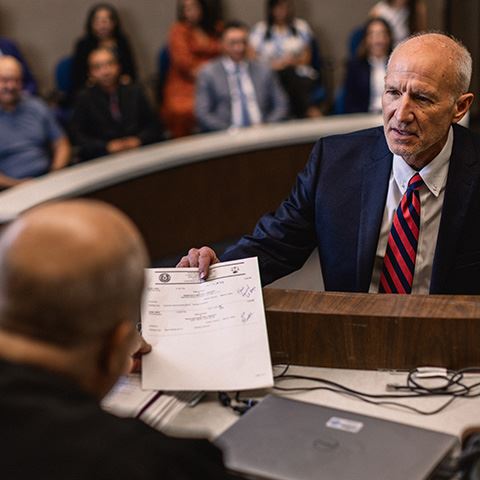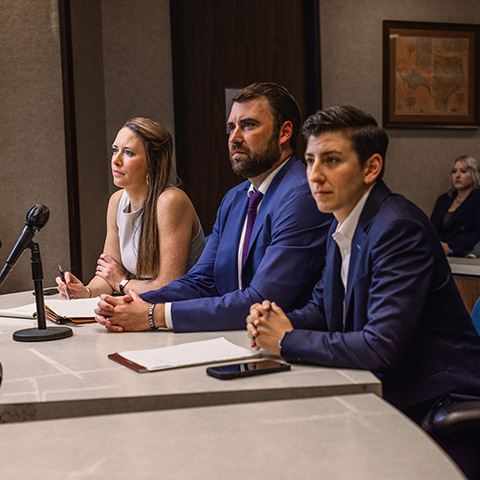Texas Commercial Contract Dispute Attorneys
Lawyers Experienced in Texas Commercial Contract Disputes
At Hilliard Law, we fiercely advocate for businessowners who have been victimized, whether through unfair trade practices, breach of contract, and other forms of commercial misconduct. Our Texas commercial contract dispute lawyers are skilled negotiators and litigators with decades of experience. As your staunch advocates, we will diligently examine every detail of your case to uncover all available paths forward.
We understand the toll commercial disputes can exert on your organization's resources, reputation, and focus. Our dedicated team of seasoned attorneys can offer solutions-oriented representation that protects your organization’s interests. Leveraging in-depth legal knowledge and experience across a broad spectrum of industries, we devise robust strategies capable of mitigating risks, resolving conflicts, and even turning disputes into opportunities for growth and innovation.
If your business has become involved in a commercial dispute, turn to our team for tailored guidance.
Call (866) 927-3420 or fill out our online contact form to schedule an initial consultation.


What Is a Commercial Contract?
A commercial contract is a legally binding agreement between two or more parties where all participants have mutually agreed upon terms and conditions pertaining to the exchange of goods, services, or financial transactions. This may encompass a wide array of agreement types, including (but not limited to) supply contracts, distribution agreements, and service contracts. Commercial contracts serve as the bedrock of business relationships, providing a clear framework of obligations, rights, and protection for involved parties, while also establishing a concrete timeline for the delivery of goods or services.
Commercial contracts are meticulously detailed, outlining specifics such as the quantity of goods to be delivered, the stipulated period of service, the agreed-upon price, as well as terms of payment. Crucially, they also contain provisions related to remedies and actions to be taken in the event of a breach. This can be crucial in protecting the rights of each party and ensuring smooth and predictable business operations.
However, commercial contracts are not static, one-size-fits-all documents. They need to be carefully crafted and customized to address the unique needs and situations of the contractual parties. This is where our Texas commercial contract dispute attorneys can become indispensable. Our legal professionals can ensure that all contracts are drafted and reviewed with precision, helping to proactively prevent potential disputes and protect our clients' commercial interests.
What Constitutes a Breach of Contract?
A breach of contract occurs when one or more parties involved in the contractual agreement fail to fulfill their obligations as stipulated in the document. This can take several forms, each carrying its own legal implications.
The most straightforward type of breach is a material breach, also known as a total breach. This occurs when a party fails to perform a duty that is a fundamental component of the agreement, thereby irreparably damaging the value of the contract. For instance, if a manufacturer fails to deliver a specified product to a retailer within the agreed-upon time, this constitutes a material breach. Such an offense typically allows the aggrieved party to sue for damages and terminate the contract.
Conversely, a partial breach, or immaterial breach, involves a minor offense, such as minor deviations in product quality or slight delays in delivery. In these cases, the injured party may still be entitled to sue for damages but typically cannot abandon the contract altogether.
An anticipatory breach refers to a situation where one party makes it clear, either through words or actions, that they will not fulfill their part of the agreement in the future. This allows the innocent party to take legal action even before an actual breach occurs.
Lastly, the breach of warranty involves a failure to fulfill a specific promise about the product or service's characteristics or performance. This type of breach doesn't typically allow for contract termination, but the aggrieved party can often claim damages.
Whether a breach is material or partial can significantly affect the remedies available to the aggrieved party. Understanding the nature of the breach and its implications is therefore crucial in seeking appropriate redress. At Hilliard Law, our seasoned Texas commercial contract dispute lawyers can review the nature of the breach you are the victim of and walk you through your legal options.
Other Types of Commercial Contract Disputes
Beyond breaches of contract, we are prepared to provide comprehensive advocacy in many types of contractual disputes where your organization’s rights were violated. We are experienced litigators and are not afraid to go to court, if necessary.
Unfair business practices include unethical, deceptive, or misleading actions that violate contractual obligations and expectations. Often, these practices are intentionally designed to gain an unfair advantage over competitors or to manipulate business partners.
One common form of unfair business practices that can impact commercial contracts is false or misleading advertising. Businesses may provide inaccurate or misleading information about their products or services to lure other businesses into transactions that they might not have agreed to if they were fully informed. This can range from overexaggerating the performance or benefits of a product or service to outright falsehoods regarding the product's characteristics. When businesses rely on misleading information to make decisions, such as entering into a contract, it creates an imbalance and can lead to disputes.
The use of unconscionable contractual terms or conditions can also be considered an unfair business practice. These are terms that are so heavily stacked in favor of one party that they undermine the principle of mutual benefit that commercial contracts are built upon. This could include terms that limit the liability of one party to an unreasonable extent or clauses that allow a party to change the terms of the contract unilaterally without the consent of the other party.
Business fraud is a deceptive and unlawful practice that can cause significant harm to contractual relationships. It typically involves deliberate acts of dishonesty perpetrated for personal or business gain and is often characterized by misrepresentation, deceit, or concealment of important facts. From a contractual standpoint, business fraud disrupts the level playing field and mutual trust necessary for healthy commercial relationships and can cause substantial financial and reputational damage to the victimized party.
In the context of commercial contracts, fraud can manifest in various forms. One such form is contract fraud, which arises when a party intentionally misrepresents or conceals crucial facts during the contract formation process. Often, the intent is to persuade the other party to enter into an agreement under false pretenses. This could involve overstating the value or quality of goods or services, providing false credentials or references, or hiding serious defects or liabilities. When such fraud is discovered, it not only disrupts the execution of the contract but can also lead to its rescission, leaving the affected party to grapple with unforeseen losses.
Moreover, business fraud can extend to performance fraud, which occurs when a party deliberately fails to fulfill their contractual obligations. This might involve delivering goods or services that significantly deviate from what was agreed upon or failing to perform duties at the stipulated time. Performance fraud disruptively affects business operations, often forcing the aggrieved party to seek alternative solutions and incur additional costs.
Fraudulent transfers can also be a source of harm in contractual relationships. This involves the shifting of assets to a third party to prevent them from being claimed by creditors in case of a breach of contract. Such actions not only undermine the rights of the aggrieved party but also create a climate of uncertainty and mistrust, discouraging future business dealings.
Our Texas commercial contract dispute attorneys understand the destructive implications of unfair business practices as well as fraud. We are equipped with the necessary knowledge and resources to navigate these complex legal issues, ensuring our clients receive the justice and compensation they deserve when their organizations suffer harm due to these and other forms of commercial misconduct.
Do not wait to discuss your legal options if your business suffered harm due to commercial conduct. Call (866) 927-3420 or fill out our contact us today via our online contact form.



Real Results ReaL Justice
-
$50Class Action
Million Settlement*Mr. Hilliard was the lead class counsel in Haese v. H&R Block, a class action lawsuit involving every Texan who received a rapid refund from H&R Block (approx. 300,000 plaintiffs). He assisted other class counsel in forcing H&R Block to disclose it received kickbacks for arranging loans between its tax preparation clients and predatory lenders.
-
$20Property Damage
Million SettlementOn the eve of the arbitration hearing, Hilliard Law attorneys obtained a $20 Million settlement on behalf of Nueces County, Texas for property damage that occurred as a result of Hurricane Harvey.
-
$13.5Predatory Lending
Million VerdictIn 2005, Mr. Hilliard represented multiple plaintiffs in litigation with Ocwen Loan Services, LLC (formerly Ocwen Federal Savings Bank) on allegations of predatory lending. Mr. Hilliard tried two cases which resulted in combined verdicts of $13.5 million.
What Is the Statute of Limitations for Breach of Contract Claims in Texas?
For written contracts, Texas law stipulates a four-year statute of limitations. This means that if your organization wishes to bring a lawsuit for a breach of a written or oral contract, it must do so within four years from the date the breach occurred. After this period, the claim is typically barred, and the court will dismiss the case on these grounds.
However, it is important to note that there are certain exceptions and nuances related to the statute of limitations. For instance, if your organization can successfully argue that it only became aware of the breach after a certain period, the discovery rule may apply. In such cases, the clock starts ticking from the date of discovery of the breach, rather than the actual date of the breach.
Furthermore, in some situations, the statute of limitations can be "tolled," or paused. This happens when the person or entity responsible for the breach leaves the state of Texas for a time or conceals themselves within the state, delaying the aggrieved party's ability to bring a lawsuit. In such scenarios, the statute of limitations does not run for the period the defendant is absent or concealed.


It’s our mission to hold the powerful accountable for their wrongdoing. Reach out to our team immediately regarding your case to schedule a free attorney consultation today.


